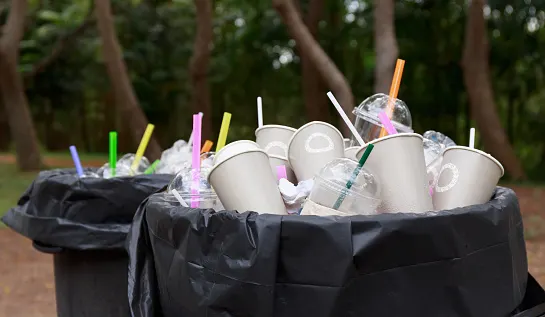
Ontario considers ban on straws and single use plastics
The Ontario government recently released a discussion paper that considers current and new waste management strategies, and is weighing public input on how the problem can be best addressed, and whether Ontarians are interested in a 'straw ban.'
It is estimated that nearly one tonne of waste per person in Ontario is generated each year, and over the last three decades only 30 per cent of that waste is diverted away from landfills through recycling and composting.
The development of large-scale technological strategies to recycle waste has not kept up with the increasing amount of waste produced in the province, and the discussion paper states that Ontario has only 10 to 20 years of landfill capacity left.
The negative impacts on the environment, which are projected to continuously grow, are staggering - approximately 10,000 tonnes of plastic debris enter the Great Lakes each year, and Ontario's Blue Box recycling program recovers less than 30 per cent of all plastic packaging in Ontario.
Plastic waste is not just a provincial problem - a global study reports that microplastics have been found in 93 per cent of bottled water, and another study states that by 2050 there will be more plastic in the ocean than fish, by weight.
While some single-use plastics will still be used to maintain safe food handling practices, items that will be targeted in the new waste management plan include plastic bottles, containers, straws, and cutlery.
In May 2018 Vancouver voted to ban plastic straws, foam cups, and containers by mid 2019, and it is reported that the Ontario government will look to British Columbia to learn about their experience with the changing waste regulations.
Ontario has had previous success with improving waste management - the creation of the Blue Box recycling program has saved municipalities over $125 million each year since it's creation, and the proposal aims to reduce litter in waste throughout all communities by: reducing and diverting organic food waste from homes and businesses, reducing litter in neighbourhoods and parks, and giving the people of Ontario more opportunities to participate in waste reduction efforts.
The discussion paper states that for every 1,000 tonnes of waste diverted from landfills, seven full time jobs are created, as well as $700,000 in Gross Domestic Product (GDP). In addition to stimulating the economy, recovering waste can even become a source of energy for the province.
Sweden's waste management strategy is a great example of how waste can have benefits to the economy and energy sector. Only 1 per cent of Swedish municipal waste is sent to landfills, 51 per cent is sent to facilities that can generate electricity from the waste and provide heat to surrounding communities, and the remaining 48 per cent of municipal waste is recycled or composted.
While the ideas and success stories are there, the question is how unprecedented the changes to the provinces waste management strategy will be. The Ministry of Environment, Conversation and Parks state that they want to hear what you think, and the discussion paper asks for your thoughts and opinions by communicating over email or submitting a comment on their website. Comments are being accepted until April 20, 2019.










